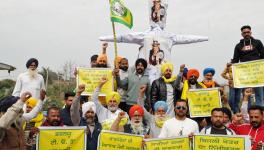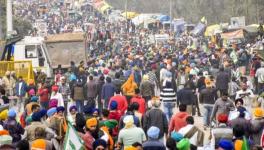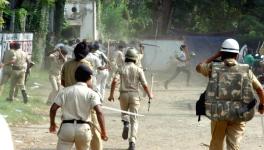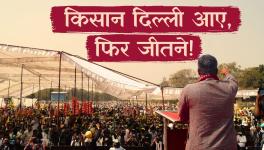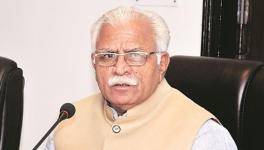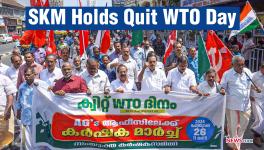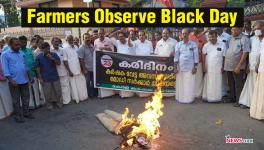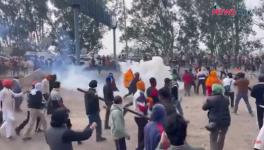Gujarat Farmers Gear Up to Fight Against Bullet Train Land Grab in Supreme Court

In a major setback to the farmers of South Gujarat, the Gujarat High Court on September 20 dismissed 59 sets of petitions moved by farmers against the process of land acquisition for Bullet Train project.
In their petition, the farmers had challenged the land acquisition process adopted by the Gujarat government for the project and had also demanded four times the prevailing market rates as compensation for the land. The High Court, while upholding the land acquisition process stated that farmers were free to approach the government to negotiate compensation at an appropriate time.
Anand Yagnik, advocate representing the farmers stated, “Out of nearly 6,900 farmers who will be affected by the project, about 60% of them have objection to the process of land acquisition. They will now approach the Supreme Court along with about 1,500 non-farmer landowners whose houses will be affected by the project.”
Also read: Bullet Train: Gujarat Farmers Move HC Opposing Forceful Land Acquisition
“We are shocked and our faith in judiciary has been shaken but the farmers have not lost all hope. We are gearing up for challenging the decision in Supreme Court,” said Nipul Patel, a farmer from Bharuch and one of the petitioners.
“Farmers from Bharuch district had filed most of the petitions even though many small-scale farmers of the district succumbed down to pressure of the authorities and accepted the money being offered. We don’t blame them. Farmers have been going through agrarian crisis for a long time now. But nonetheless, our land is all we have to depend on and it is our perennial source of income. We will fight for our land even if Supreme Court disappoints us. We have heard about farmers’ protests in Singur and Nandigram in Bengal that drove away the company. We, too, are ready to fight on ground,” Patel told NewsClick.
“Only 50% of the farmers of Valsad district have agreed to part with their land and accepted the monetary compensation. Farmers of Valsad aren’t just fighting against Bullet Train project, several other projects including Freight Corridor, National Highway (joining Ahmedabad and Mumbai) and various gas pipelines pass through the district. Each project takes away a chunk of our land. Even for the Bullet Train project, authorities have announced price for the agrarian land. No compensation has been announced for houses or mango orchards that will be affected or acquired under the project,” Rupesh, a farmer from Atgam village, Valsad district said.
“Small scale farmers have given up mostly. It is not possible for them to stand up against the pressure from the authorities of National High Speed Rail Corporation Limited (NHSRCL). But there are farmers who are still ready to fight and hoping for a decision in their favour from Supreme Court,” he added.
The legal fight of farmers against land acquisition for the Bullet Train project began in June 2018, when five farmers of Surat district filed petitions in the High Court. Later, the five farmers withdrew their petition but hundreds of other farmers from affected districts of south and central Gujarat moved to High Court challenging the land acquisition process, the amendments made by Gujarat government in the Right to Fair Compensation and Transparency in Land Acquisition, Rehabilitation and Resettlement Act, 2013, and demanding more compensation.
Also read: Farmers In Central Gujarat Continue Protests Against Bullet Train Land Acquisition
Almost 1,000 farmers had then signed an affidavit registering their objection to the process of land acquisition and demanded that the compensation should be at par with the central land acquisition law under the 2013 Act. The law regulates land acquisition and lays down the procedure and rules for granting compensation, rehabilitation and resettlement to the affected persons in India.
The Gujarat High Court held that the President had given his assent to delegation of power with retrospective effect to Gujarat state government, hence, it enjoys legal validity for undertaking the land acquisition process. The division bench of Justice Anant Dave and Justice Biren Vaishnav also stated that the court was of the opinion that the provision of not conducting social impact assessment under the amended Act (Right to Fair Compensation and Transparency in Land Acquisition, Rehabilitation and Resettlement [Gujarat Amendment] Act, 2016) does not fall into the category of “excessive delegation” as contended by the farmers in their petitions. The HC justified the State’s move to not implement mandatory provisions of conducting Social Impact Assessment adding that the Social Impact Assessment process carried out under the Japan International Cooperation Agency (JICA) guidelines were appropriate and satisfactory.
Also watch: Along the Tracks of Bullet Train- A Ground Report
Noticeably, days before the Court’s decision, Achal Khare, the Managing Director of the NHSRCL had said that out of 1,380 hectares land required for the project, the organisation had already acquired 622 hectares.
“The Gujarat High Court’s judgement on the matter of Bullet Train project is bad in law, spirit and undesirable in many ways. Crucial principles of the law of land, legal and other issues raised in the petitions are not dealt within proper legal framework either in letter or in spirit. Instead, a critical and complex matter has been narrowed down to simple opinion by the HC without a sound basis, critical examination of all facts, democratic process of decision making, and the social and environmental impact,” Rohit Prajapati, a Gujarat-based environmental activist, who has represented the issue before authorities of JICA, told NewsClick.
“This judgement sets a bad precedent but we will fight it,” he added.
Get the latest reports & analysis with people's perspective on Protests, movements & deep analytical videos, discussions of the current affairs in your Telegram app. Subscribe to NewsClick's Telegram channel & get Real-Time updates on stories, as they get published on our website.









